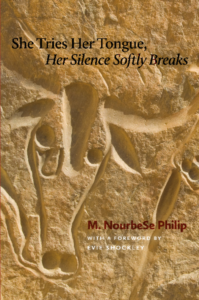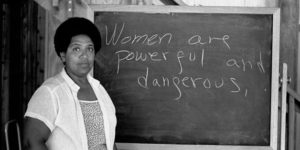Rebekah Edwards is an MA Candidate at SOAS University of London.
NourbeSe Philip and destroying the English language, Lorde on Feminist representation: Can we Dismantle the Master’s House by Sharpening his Tools?

M. NourbeSe Philip, She Tries Her Tongue, Her Silence Softly Breaks (1989) book cover.
NourbeSe Philip is a Caribbean poet, writer and lawyer living in Canada whose main concern is the experience of Black women and girls, more specifically, their issues of belonging, language, place and location. In her essay entitled: The Absence of Writing or How I Almost Became a Spy, Philip argues that Africans in the diaspora have been violently torn from their African languages and left with the colonial English language which serves to articulate the non-being of the African. For Philip, the challenge facing the African diaspora writer is to make the English language their own by consciously restructuring, reshaping and if necessary, destroying the English language in such a way that the historical realities are not erased or obliterated, but so English is revealed as the tainted tongue it truly is[1].
Indeed they must act as spies and use the master’s father-tongue to launch a counter linguistic assault upon the very tool that works to negate and degrade the black image. For Philip the very source of artistic expression, the “i-mage” – or the “thing-to-be-expressed”, is at stake in this act of linguistic decoding and recovery. A tool that works to deny the essential humanity of a people can never be truly capable of giving voice to that groups experiences without fundamental changes being made to the language itself; thus the tool must be sharpened.
With Philip’s astute commentary ringing in my ears I ask, can the act of recycling the English language liberate those who have been snubbed by the hegemonic power, is it a way of turning the master’s tool, and its negative intentions, against itself to be used as a device that dismantles the master’s unhinged, socially stratified house?
Philips observation explicitly reveals the detachment between the colonial language that the African diaspora use to communicate and their i-mage (by privileging the I, Philip centres self-identity), a theory that resonates with W.E.B. Du Bois theory of double-consciousness. Although Du Bois focuses on the experience of African-Americans in a racist white society, the theory can be readily applied to the entire diaspora, and his notion of two-ness is extended into three-ness for black women who are aware of themselves as black and female in a white, masculine world. Hence it can be said that the black female possesses a triple consciousness; her self identity vs the identity created for her not only as a black individual in a hegemonic space but as a female in a patriarchal space.
But how do we deal with this intersection? This intersection of gender and race is why black women regularly reside at the bottom of social stratification and consequently have the least representation in society, this under-representation becomes further diluted by class, sexuality and cultural barriers including language. For Philip, the mission was to make the English language “fit her own mouth”, yet for some women the task is how to communicate on global feminist platforms with their local, non-European language. This is why the restricted space of feminism must actively work to provide a voice and space for those that reside in this crucible of difference.

AUDRE LORDE – ROBERT ALEXANDER/ARCHIVE PHOTOS/GETTY IMAGES
In her 1983 article, ‘The Master’s Tools Will Never Dismantle the Master’s House’ Audre Lorde addressed her concern for the lacking representation of women that did not immediately fit within the confined space of the feminist circle. A major concern for Lorde, and women alike, is that the feminist space prioritises issues that are primarily chief concerns for white, metropolitan women, all the while ignoring the experiences and issues faced by women around the world, including third-world, queer and women of colour.
Speaking to a female audience, Lorde declares that the master’s tools that carved our individualities as problematic, which taught us to ignore our differences or see them as reasons to remain separate, cannot be used to dismantle the master’s house. Lorde cries for a rallying of all the women that stand outside the circle of society’s definition of acceptable women, in order to define and seek a world in which we can all flourish. Since difference is that raw and powerful connection from which our personal power is forged, we must learn how to take our differences and make them our commonality.
We must accept that the oppressed can be oppressing and the liberal elitist female who communicates that she is not racist in any way is as much of the problem as anything else. In this Trump era, it is becoming more obvious that extreme racism exists, however a major issue stems from those who fail to acknowledge inadvertent racism and who think that they don’t have a racist bone in their bodies because they don’t wear white bedsheets on the weekend.
As individuals we must learn to appreciate the variety in humanity; our complexions, our histories, our cultures.. I have seen individuals work themselves into a rage because the person next to them is speaking loudly in another language!
We all must learn to celebrate and proliferate the multi-lingual, culturally diverse platforms that represents women across the world. Racial feminism is revealing itself in its failure to recognise difference amongst women as a crucial strength and by continuing to overlook the differing, unique problems faced by women around the world. It is detrimental that women face the racism found in feminism, a space that offers liberation for all women, only be acknowledging it can we work to overcome and transform the inclusivity of the space in every language.
[1] M. NourbeSe Philip, She Tries her Tongue, Her Silence Softly Breaks. (Connecticut: Wesleyan University Press, 1989). p 87.
Philip, M. NourbeSe. ‘She Tries Her Tongue, Her Silence Softly Breaks’. (Connecticut: Wesleyan University Press, 1989).
Lorde, Audre. ‘The Master’s Tools Will Never Dismantle the Master’s House’ pp 94-101 in Cherrie Moraga and Gloria Anzaldua (eds), This Bridge Called My Back: Radical Women of Color (New York, Kitchen Table Press, 1983).


Leave A Comment